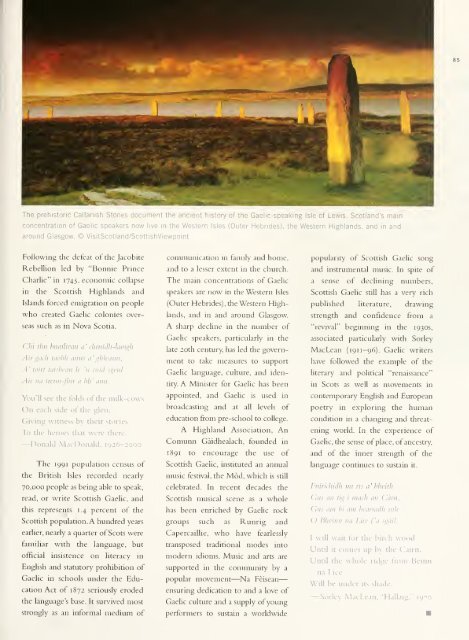SCOTLAND - Smithsonian Digital Repository - Smithsonian Institution
SCOTLAND - Smithsonian Digital Repository - Smithsonian Institution
SCOTLAND - Smithsonian Digital Repository - Smithsonian Institution
You also want an ePaper? Increase the reach of your titles
YUMPU automatically turns print PDFs into web optimized ePapers that Google loves.
—<br />
85<br />
The prehistoric Callanish Stones document the ancient history of the Gaelic-speaking Isle of Lewis. Scotland's main<br />
concentration of Gaelic speakers now live in the Western Isles (Outer Hebrides), the Western Highlands, and in and<br />
around Glasgow. © VisitScotland/ScottishViewpoint<br />
Following the defeat of the Jacobite<br />
Rebellion led by "Bonnie Prince<br />
Charlie" in<br />
1745, economic collapse<br />
in the Scottish Highlands and<br />
Islands forced emigration on people<br />
who created GaeUc colonies overseas<br />
such as in Nova Scotia.<br />
Chi tlin huailteciii a' cliniidh-hioiiih<br />
Airgach taohh anus a' gbkaiin,<br />
A ' toirt taisbean k 'n ciiid sgetd<br />
Air na treun-fhir a bli' ami.<br />
You'll see the folds of the milk-cows<br />
On each side of the glen,<br />
Giving witness by their stories<br />
To the heroes that were there.<br />
—Donald MacDonald, 1926-2000<br />
The 1991 population census of<br />
the British Isles recorded nearly<br />
70,000 people as being able to speak,<br />
read, or write Scottish<br />
Gaelic, and<br />
this represents 1.4 percent of the<br />
Scottish population. A hundred years<br />
earher, nearly a quarter of Scots were<br />
familiar with the language, but<br />
official insistence on literacy in<br />
Enghsh and statutory prohibition of<br />
Gaelic in schools under the Education<br />
Act of 1872 seriously eroded<br />
the language's base. It survived most<br />
strongly as<br />
an informal medium of<br />
communication in family and home,<br />
and to a lesser extent in the church.<br />
The main concentrations of GaeUc<br />
speakers are now in the Western Isles<br />
(Outer Hebrides), the Western Highlands,<br />
and in and around Glasgow.<br />
A sharp decUne in the number of<br />
Gaehc speakers, particularly in the<br />
late 20th century, has led the government<br />
to take measures to support<br />
Gaehc language, culture, and identity.<br />
A Minister for Gaehc has been<br />
appointed, and Gaehc is used in<br />
broadcasting and at all levels of<br />
education from pre-school to college.<br />
A Highland Association, An<br />
Comunn Gaidhealach, founded in<br />
1891 to encourage the use of<br />
Scottish Gaehc, instituted an annual<br />
music festival, the Mod, which is<br />
still<br />
celebrated. In recent decades the<br />
Scottish musical scene as a whole<br />
has been enriched by Gaehc rock<br />
groups such as Runrig and<br />
Capercaillie, who have fearlessly<br />
transposed traditional modes into<br />
modern idioms. Music and arts<br />
are<br />
supported in the community by a<br />
popular<br />
movement—Na Feisean<br />
ensuring dedicarion to and a love of<br />
Gaehc culture and a supply of young<br />
performers to sustain a worldwide<br />
popularity of Scottish Gaehc song<br />
and instrumental music. In spite of<br />
a sense of declining numbers,<br />
Scottish Gaehc still has a very rich<br />
published literature, drawing<br />
strength and confidence from a<br />
"revival" beginning in the 1930s,<br />
associated particularly with Sorley<br />
MacLean (1911—96). Gaehc writers<br />
have followed the example of the<br />
hterary and pohtical "renaissance"<br />
in Scots as well as movements in<br />
contemporary Enghsh and European<br />
poetry in exploring the human<br />
condition in a changing and threatening<br />
world. In the experience of<br />
Gaehc, the sense of place, of ancestry,<br />
and of the irmer strength of the<br />
language continues to sustain it.<br />
Fuirichidh mi ris a' bhcith<br />
Giis an tig i mach an Cam,<br />
Oils am hi am beairadb iiile<br />
Blieinn na Licefa sgail.<br />
1 will wait for the birch wood<br />
Until it comes up by the Cairn,<br />
Until the whole ridge from Bcinn<br />
na Lice<br />
Will be under its shade.<br />
—Sorley MacLean, "Hallaig," 1970
















